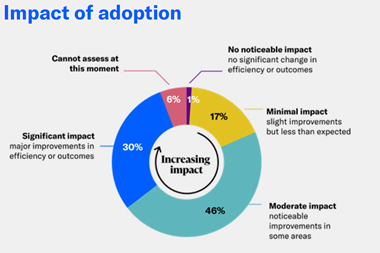Marsh and Kroll hosted a recent event debating the impact of the UK’s new Bribery Act on businesses. Here’s what happened
In a packed Old Library at the Lloyd’s building in London, representatives from UK businesses gathered to hear a panel of experts, assembled by Marsh and Kroll, debate the implications of the UK’s new Bribery Act.
In the interactive session chaired by Marsh EMEA financial and professional practice leader Roy White, the audience, which included representatives from many of the UK’s largest companies, quizzed a panel of experts on aspects of the Act, as well as querying how companies should embed an anti-corruption culture.
Head of Kroll’s London financial investigations practice Richard Abbey kicked off proceedings with a summary of the new legislation. He explained how the new law had simplified existing legislation, and outlined its four general offences: to offer, promise, give or receive a bribe; to agree to receive a bribe; the bribery of a foreign public official; and failure to prevent bribe paying.
He warned those present about the extra-territorial jurisdiction of the new Act, as well as the prospect of unlimited fines against corporates found guilty of corruption.
Abbey also indicated that the offence extended beyond direct employees of a company, meaning that organisations are responsible for the conduct of their consultants who operate on their behalf. Key to a successful defence, he said, would be a company demonstrating that it has adequate procedures in place to prevent a bribe being paid.
It is in the use of intermediaries that the biggest risk resides, Abbey warned. Therefore, a focus on third parties is crucial, and companies should fully understand the political risk that their agents are exposed to.
Taking action
Richard Williams, who sits on the board of directors of engineering and development consultancy Mott MacDonald, provided an insight into organisational anti-bribery procedures in action. As Mott MacDonald trades on its reputation, he said, it therefore takes anti-bribery measures very seriously. The company runs the risk of having major contracts withdrawn if it is found to be behaving improperly. Section 7 is the relevant part of the legislation, Williams said, and went on to outline how to respond to this section.
Training programmes are vital, but it is just as important to monitor how many staff are actually achieving the training, he said. Williams indicated that companies should have a whistleblowing hotline so they are made aware of problems, and they should have the ability to conduct internal investigations. Internal compliance audits need to be in place, he said, starting with high-risk countries and high-risk sectors. The message has to come from the top, he added. “Leaders will get the level of ethical behaviour they demonstrate they want.”
Williams said that organisations should have a policy in place that explains how the company expects its employees to behave. Underneath that and reinforcing it, there should also be a policy that explains how to do it. He also argued that companies that take a strong stance on bribery may have the opportunity to stand above their competitors. Taking a firm position that the organisation will not pay or accept bribes has the potential to be a strong selling point, he said.
“Bribery is wrong,” Williams added. “We see it on the top of our risk register, and anyone who has got a reputation that they are proud of will be the same.”
Transparency International’s chairman, John Drysdale, added to the debate by asserting that corporate culture is supremely important. “The tone from the top should be one of zero tolerance for corruption,” he said. “It must be clear, unambiguous and widely disseminated.”
Drysdale also warned that the Department of Justice, the US anti-bribery enforcement agency, is taking a much more proactive approach to compliance with the Foreign Corrupt Practices Act. “More than 150 investigations are on the go,” he said. “And quite a few of these relate to UK companies.”
Drysdale also argued that corporate ethics now matter to shareholders and stakeholders as never before. “A wind of change is blowing,” he said. “Nowadays, companies are more subject to public scrutiny, and the court of public opinion is against companies paying bribes.”
Danger zones
Following an audience question about which corporate entities are most exposed to bribery risk, Abbey responded that breaches commonly occur in small family-run businesses that global firms have acquired as part of their overseas expansion plans, but continue to be run with the culture of a small private business.
Drysdale pitched in with a reference to Transparency International’s Bribe Payer’s Index, which rates the construction, extraction and defence industries as the most prone to paying bribes. He also indicated that companies that do business in countries perceived to be at risk of corruption are at a greater risk of becoming embroiled in it themselves. Similarly, he said, if they deal with public officials or foreign agents as part of their normal business operations, they could be more exposed to bribery.
Law firm Addleshaw Goddard partner Elizabeth Robertson provided some clarification of the legal issues. She said that “facilitation payments”, which are distinct from bribes under US legislation, will continue to be unlawful under the new UK Act.
“The Organisation for Economic Co-operation and Development is onto it,” she added. “Facilitation payments will be unlawful under all key pieces of legislation within a couple of years.”
The question of whether or not to self-report was also raised. Companies usually receive better treatment from the authorities if they confess after uncovering a bribery incident.
Robertson encouraged them to do so, but cautioned that the Serious Fraud Office, the anti-bribery enforcement agency in the UK, is not able to give a company or its directors a firm guarantee about how they will be treated in court if convicted of bribery.
Eleni Petros, a senior vice-president in Marsh’s financial and professional practice, gave a brief summary of the implications of the new law for directors’ and officers’ (D&O) insurance. She explained that standard D&O policies have exclusions for fraud and criminal conduct. Given that the exclusion only takes effect when a director is found guilty of an offence, in certain circumstances a D&O policy may be able to provide for defence costs, she said.
In closing, Mott MacDonald’s Williams urged companies to take a long-term view on bribery and corruption, although he accepted that in the short term not paying bribes could have a negative effect on a company’s ability to carry out business in certain markets.
Drysdale also spoke plainly. “It is possible to have a zero-tolerance policy on bribery and still do business in corrupt countries and succeed,” he said, concluding that “corrupt business is bad business”.



















